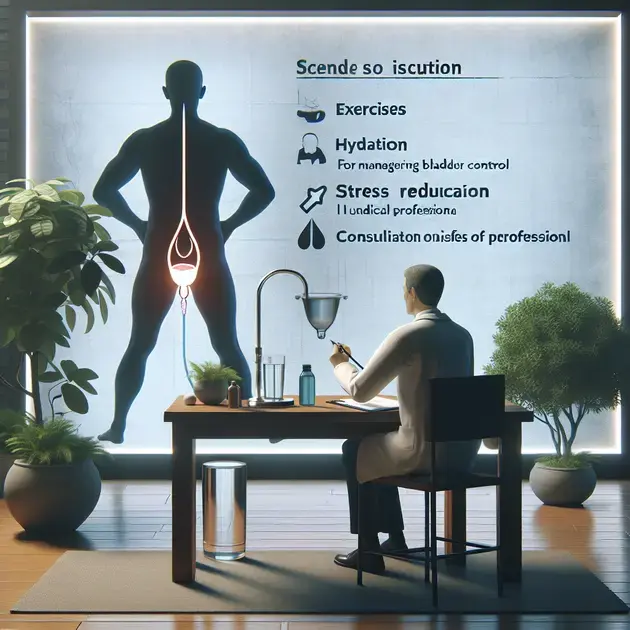It can be a frustrating and embarrassing challenge to constantly deal with the need to urinate. Whether it’s due to medical conditions like overactive bladder or simply drinking too much water, the constant urge to urinate can significantly impact daily life and activities. This issue can be particularly troublesome when trying to focus at work or enjoy social outings.
One important aspect of managing the challenge of constantly having to urinate is to stay hydrated while also being mindful of the types of fluids you consume. Avoiding bladder irritants such as caffeine and alcohol can help reduce the frequency of urination. Additionally, practicing pelvic floor exercises and seeking guidance from healthcare professionals can provide valuable strategies for improving bladder control.

Strategies for Managing the Urge to Urinate
Managing the urge to urinate can be challenging, especially for individuals who experience frequent or urgent needs to use the restroom. Here are some effective strategies to help you better control your bladder and reduce the urge to urinate:
1. Pelvic Floor Exercises:
One of the most recommended methods for managing the urge to urinate is by performing pelvic floor exercises. These exercises help strengthen the muscles that support the bladder and can improve bladder control over time. You can learn more about specific pelvic floor exercises and routines from the Pelvic Floor Trainer app, available for download on both Android and iOS devices.
2. Bladder Training:
Bladder training involves gradually increasing the time between bathroom visits to help retrain your bladder to hold urine for longer periods. The Bladder Trainer app offers personalized bladder training programs and reminders to help you gradually increase the time between trips to the restroom. You can find this app on the Google Play Store or Apple App Store.
3. Fluid and Diet Management:
Monitoring your fluid intake and adjusting your diet can also help in managing the urge to urinate. Certain foods and drinks, such as caffeine, alcohol, and spicy foods, can irritate the bladder and increase the urgency to urinate. The MyFitnessPal app provides tools to track your fluid intake and make informed decisions about your diet to support better bladder control.
4. Mindfulness and Relaxation Techniques:
Practicing mindfulness and relaxation techniques can help reduce stress and anxiety, which are known triggers for an overactive bladder. The Calm app offers guided meditations, breathing exercises, and sleep stories to promote relaxation and mindfulness, ultimately aiding in better bladder management.
5. Scheduled Bathroom Breaks:
Establishing a schedule for bathroom breaks, even when you don’t feel the urge to urinate, can help prevent sudden urges and accidents. The Toilet Time app allows you to set customized bathroom break reminders and track your restroom visits to create a consistent routine for managing your bladder effectively.
Tips for Hydration and Fluid Intake
Proper hydration is essential for overall health and can impact bladder function and control. Here are some tips for optimizing your hydration and fluid intake to support bladder health:
1. Drink an Adequate Amount of Water:
It’s crucial to drink enough water throughout the day to stay hydrated, but be mindful not to consume excessive amounts that can lead to frequent urination. The Water Drink Reminder app sends notifications to remind you to drink water at regular intervals and helps track your daily water intake to ensure you meet your hydration goals.
2. Monitor Urine Color:
Monitoring the color of your urine can provide insights into your hydration levels. Aim for pale yellow urine, as dark yellow or amber-colored urine may indicate dehydration. The My Water & Drink Reminder app allows you to log your urine color and receive hydration tips based on the recorded information.
3. Hydrating Foods:
Incorporate hydrating foods with high water content, such as cucumbers, watermelon, and celery, into your diet to boost your fluid intake. The Lifesum app offers personalized meal plans that prioritize hydration and provide nutritional information to help you choose water-rich foods for optimal bladder health.
4. Avoid Dehydrating Beverages:
Avoid or limit the consumption of dehydrating beverages like caffeinated drinks, as they can worsen urinary urgency and frequency. The Drink Water Reminder app tracks your beverage intake and sends alerts to ensure you stay hydrated with non-dehydrating options throughout the day.
5. Consistent Hydration Routine:
Establishing a consistent hydration routine, including drinking water at set times during the day, can help maintain proper fluid balance and support bladder function. The Hydro Coach app creates personalized hydration plans based on your weight, activity level, and climate to help you develop a sustainable hydration routine.
Seeking Professional Guidance for Bladder Control
For individuals struggling with bladder control issues that persist despite self-management strategies, seeking professional guidance is crucial. Here are steps you can take to seek professional help for bladder control:
1. Consult a Urologist:
Schedule an appointment with a urologist, a specialist in urinary tract and bladder health, to discuss your symptoms and explore treatment options. Use websites like Zocdoc or Healthgrades to find reputable urologists in your area and book an appointment online for a comprehensive evaluation.
2. Request a Urodynamic Study:
A urodynamic study is a diagnostic test that evaluates how well the bladder and urethra are storing and releasing urine. Your urologist may recommend this test to assess the underlying causes of your bladder control issues. Websites like WebMD provide detailed information on urodynamic studies to help you understand the procedure and its significance.
3. Explore Pelvic Health Physical Therapy:
Pelvic health physical therapy focuses on strengthening the pelvic floor muscles and improving bladder control through targeted exercises and interventions. Look for pelvic health physical therapists in your area using the Pelvic Rehab directory or the Herman & Wallace Pelvic Rehabilitation Institute website to initiate specialized therapy sessions.
4. Consider Medication Options:
Your urologist may recommend medications to manage overactive bladder symptoms or other bladder control issues. It’s essential to follow your healthcare provider’s guidance regarding medication use and potential side effects. Visit the Mayo Clinic website for in-depth information on medications commonly prescribed for bladder control.
5. Discuss Surgical Interventions:
In some cases, surgical interventions may be necessary to address severe bladder control problems that do not respond to conservative treatments. Consult with your urologist about surgical options, such as bladder suspension procedures or nerve stimulator implants, to improve bladder function. Websites like Healthline offer insights into various surgical interventions for bladder control concerns.

**Exploring Natural Remedies for Overactive Bladder**
Natural Remedies
When it comes to managing an overactive bladder, natural remedies can offer a gentle and effective approach. One popular natural remedy is pumpkin seed extract, which has been shown to help support bladder function and reduce urinary urgency. Additionally, acupuncture has been used for centuries to help improve bladder control and reduce incontinence symptoms.
Dietary Changes
Your diet can play a significant role in managing an overactive bladder. Foods and beverages high in acidity, such as citrus fruits, tomatoes, and coffee, can irritate the bladder and worsen symptoms. On the other hand, incorporating more water-rich foods like cucumbers and watermelon can help keep you hydrated and support bladder health.
Herbal Supplements
Herbal supplements like saw palmetto and buchu have been traditionally used to support bladder function and reduce urinary frequency. Saw palmetto, in particular, has anti-inflammatory properties that may help alleviate bladder discomfort. Buchu, on the other hand, is known for its diuretic properties, which can help reduce water retention in the body.
Hydration
Staying properly hydrated is essential for bladder health. Drinking an adequate amount of water throughout the day can help flush out toxins and irritants from your system, reducing the risk of bladder irritation. It is recommended to aim for at least 8-10 glasses of water daily to support your bladder function.
Exercise and Stress Reduction
Regular exercise and stress reduction techniques can also play a significant role in managing an overactive bladder. Exercise can help strengthen pelvic floor muscles and improve bladder control, while stress reduction techniques like yoga and meditation can help calm the nervous system and reduce urinary urgency.
**Understanding the Impact of Stress on Urinary Frequency**
How Stress Affects the Bladder
Stress has a direct impact on urinary frequency and bladder function. When we experience stress, our body releases cortisol, a stress hormone that can stimulate the bladder and lead to increased urgency and frequency of urination. Chronic stress can weaken the pelvic floor muscles and exacerbate bladder control issues.
Managing Stress Levels
Managing stress is essential for maintaining bladder health. Incorporating stress-reducing activities like deep breathing exercises, mindfulness meditation, and yoga into your daily routine can help lower cortisol levels and reduce the impact of stress on your bladder. Additionally, getting an adequate amount of sleep and practicing self-care can also help improve overall bladder function.
Seeking Support
If stress is significantly impacting your urinary frequency, it may be beneficial to seek support from a therapist or counselor. Cognitive-behavioral therapy (CBT) can be particularly effective in helping individuals manage stress and anxiety, leading to improved bladder control and reduced urinary urgency.
Healthy Lifestyle Habits
Incorporating healthy lifestyle habits like regular exercise, proper hydration, and a balanced diet can also help reduce overall stress levels and support bladder health. Avoiding caffeine and alcohol, practicing good sleep hygiene, and staying active can contribute to a more balanced and resilient nervous system, ultimately benefiting your bladder function.
Relaxation Techniques
Exploring relaxation techniques such as progressive muscle relaxation, guided imagery, and aromatherapy can provide additional support in managing stress and ultimately improving urinary frequency. These techniques can help relax both the mind and body, reducing tension and promoting better bladder function.
**
Conclusion
**
Exploring natural remedies, dietary changes, herbal supplements, hydration, exercise, stress reduction, and the impact of stress on urinary frequency provides a comprehensive approach to managing an overactive bladder. Natural remedies like pumpkin seed extract and acupuncture offer gentle yet effective ways to support bladder function and reduce urinary urgency. Dietary adjustments, such as avoiding acidic foods and incorporating water-rich options, play a significant role in bladder health.
Additionally, herbal supplements like saw palmetto and buchu, known for their benefits in supporting bladder function and reducing urinary frequency, can be valuable additions to a holistic treatment plan. Maintaining proper hydration levels, engaging in regular exercise to strengthen pelvic floor muscles, and practicing stress reduction techniques like yoga and meditation are vital for improving bladder control and reducing urinary urgency.
Understanding how stress affects the bladder underscores the importance of managing stress levels through activities like deep breathing exercises, mindfulness meditation, and seeking support from therapists. Embracing a healthy lifestyle by incorporating exercise, hydration, and a balanced diet, while avoiding caffeine and alcohol, can significantly reduce stress levels and promote overall bladder health. Exploring relaxation techniques like progressive muscle relaxation and aromatherapy can provide further support in managing stress and enhancing bladder function, ultimately leading to improved urinary frequency.